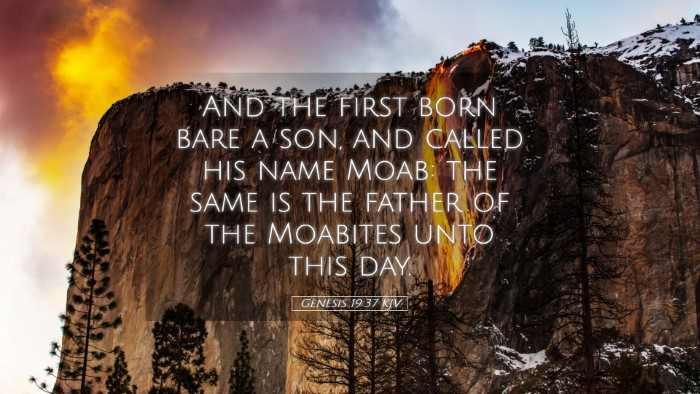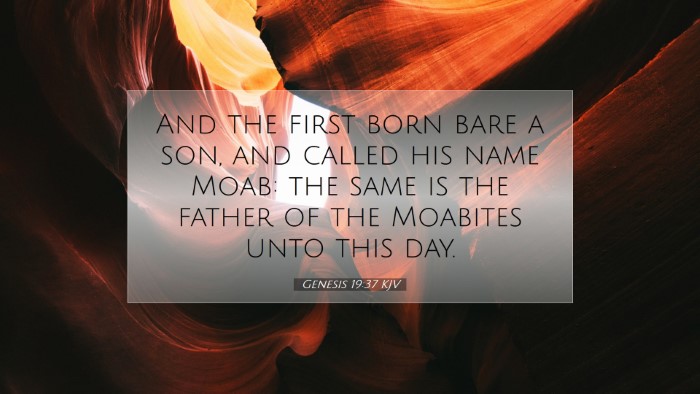Commentary on Genesis 19:37
Text of Genesis 19:37: "And the firstborn bore a son, and called his name Moab: the same is the father of the Moabites unto this day."
Introduction
This verse concludes the narrative concerning Lot and his daughters. It holds both historical significance and theological implications as it introduces Moab, a significant nation in biblical history. The commentaries provide insights into the sociopolitical backdrop of the Moabites, their lineage, and their role in the broader scriptural tradition.
Historical Context
-
Matthew Henry:
Henry emphasizes that Moab as a nation arose from an unspeakable act stemming from desperation and moral decay. Given the destruction of Sodom and Gomorrah, Lot's daughters felt the weight of isolation and sought to continue their father's lineage through unconventional means.
-
Albert Barnes:
Barnes points out that Moab's origins provide insight into the cultural context of the time. The Moabites, who descended from the incestuous relationship of Lot's daughter, were seen as a distinct group that would later have conflicts with Israel. This illustrates the complexities of heritage in the biblical narrative.
-
Adam Clarke:
Clarke notes that the name Moab itself translates as "from my father," indicating the shame associated with this lineage. He also engages in etymological discussions, exploring how this naming carries not only familial significance but also a lingering stigma.
Theological Implications
-
Genealogy and Identity:
The naming of Moab signifies the establishment of a people with a distinct identity. This has profound implications for understanding how nations and peoples are formed in the biblical narrative.
-
Desperation and Morality:
This verse raises questions about the intersection of desperation and moral choices. According to Henry, the actions of Lot's daughters reflect a desperate human condition, where moral boundaries can become blurred.
-
God's Sovereignty:
Even from such troubling origins, God weaves a narrative wherein the Moabites play a role in the history of Israel. Barnes suggests that this demonstrates God's sovereignty in guiding history, even through flawed human actions.
Significance of Moab in Biblical History
-
Conflicts with Israel:
The Moabites would later be known for their conflicts with Israel, particularly during the Israelite conquest of Canaan. This ongoing tension fulfills the prophetic insights regarding the nations that arise from Abraham's lineage.
-
Covenant Theology:
Moab's presence in scripture raises important discussions about covenant theology and how God extends His mercy even to nations born of questionable ethics. Clarke posits that despite their origin, God still engaged with them, allowing for inclusion in divine plan.
-
Messianic Ties:
Remarkably, Moab is part of the lineage leading to King David and ultimately to Jesus Christ. Thus, what began in shame and despair finds redemption through the lineage of Christ, highlighting the theme of redemption that permeates scripture.
Conclusion
Genesis 19:37 encapsulates a formative moment in biblical history that emphasizes themes of identity, morality, and divine sovereignty. The commentaries by Henry, Barnes, and Clarke, among others, highlight how from a morally ambiguous origin, a significant people—the Moabites—arose with implications for the narrative of Israel and ultimately for the redemptive story of Jesus Christ. As we reflect on this verse, we are reminded that God can work through even the most difficult circumstances to fulfill His divine purposes.


